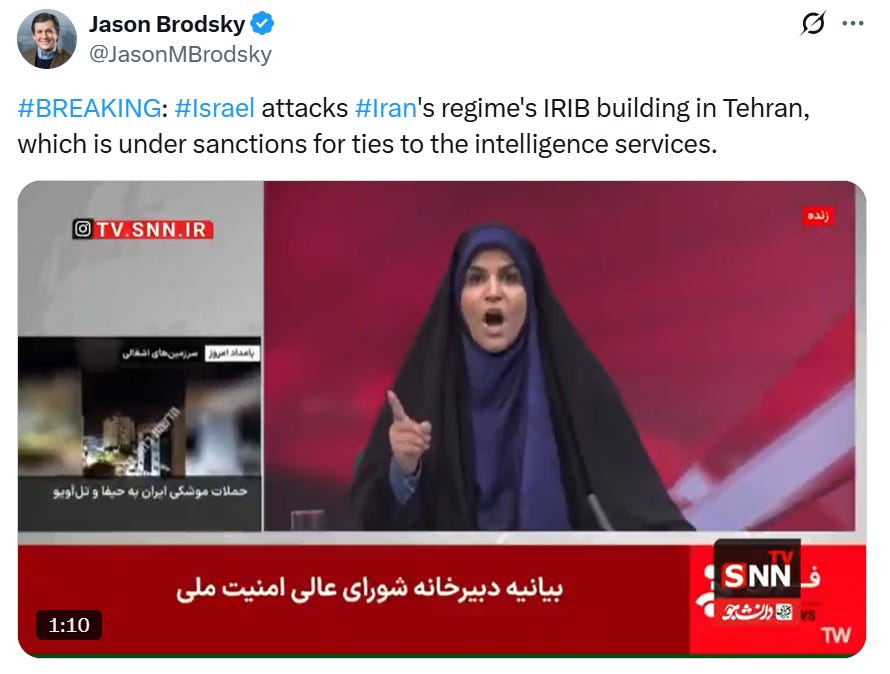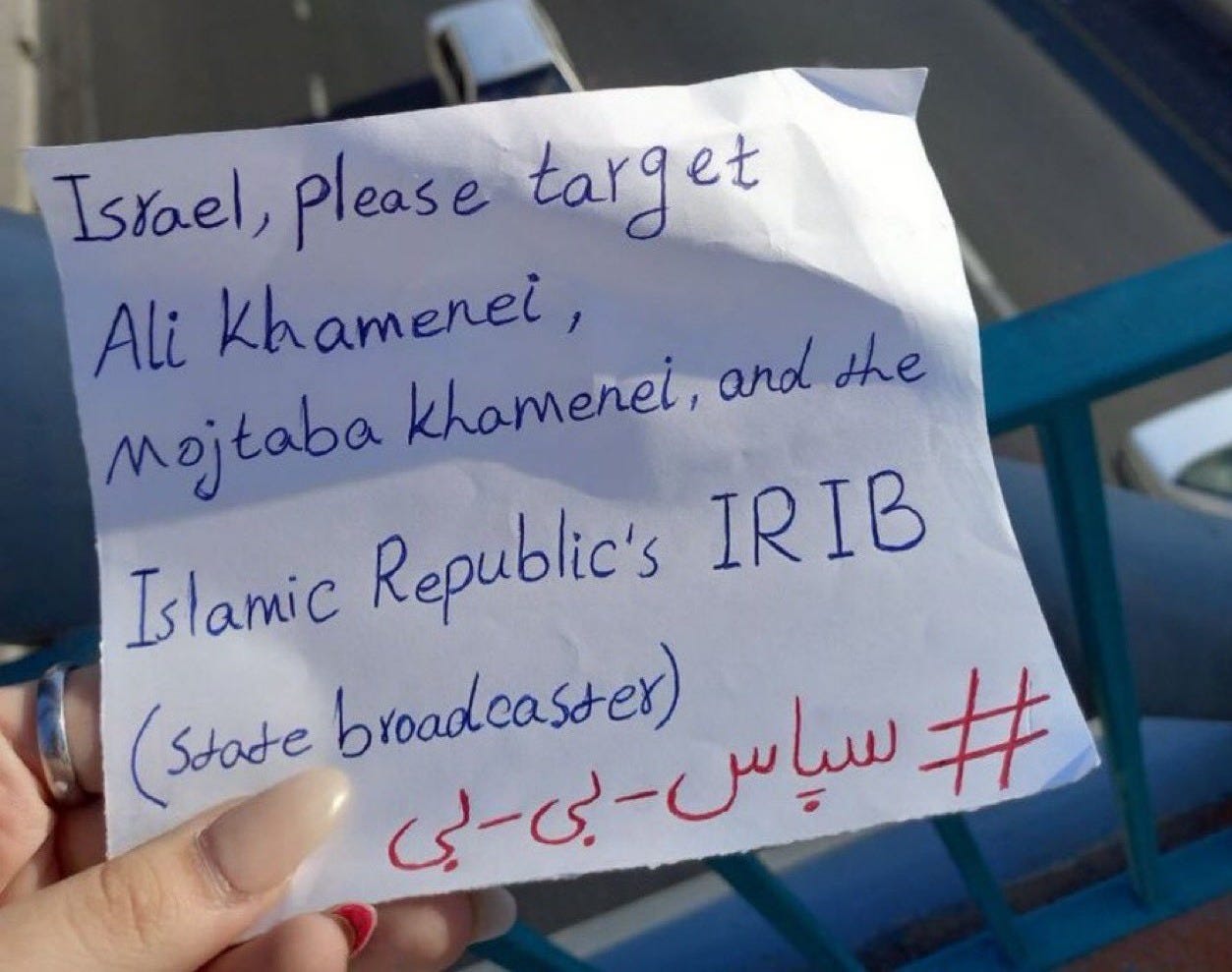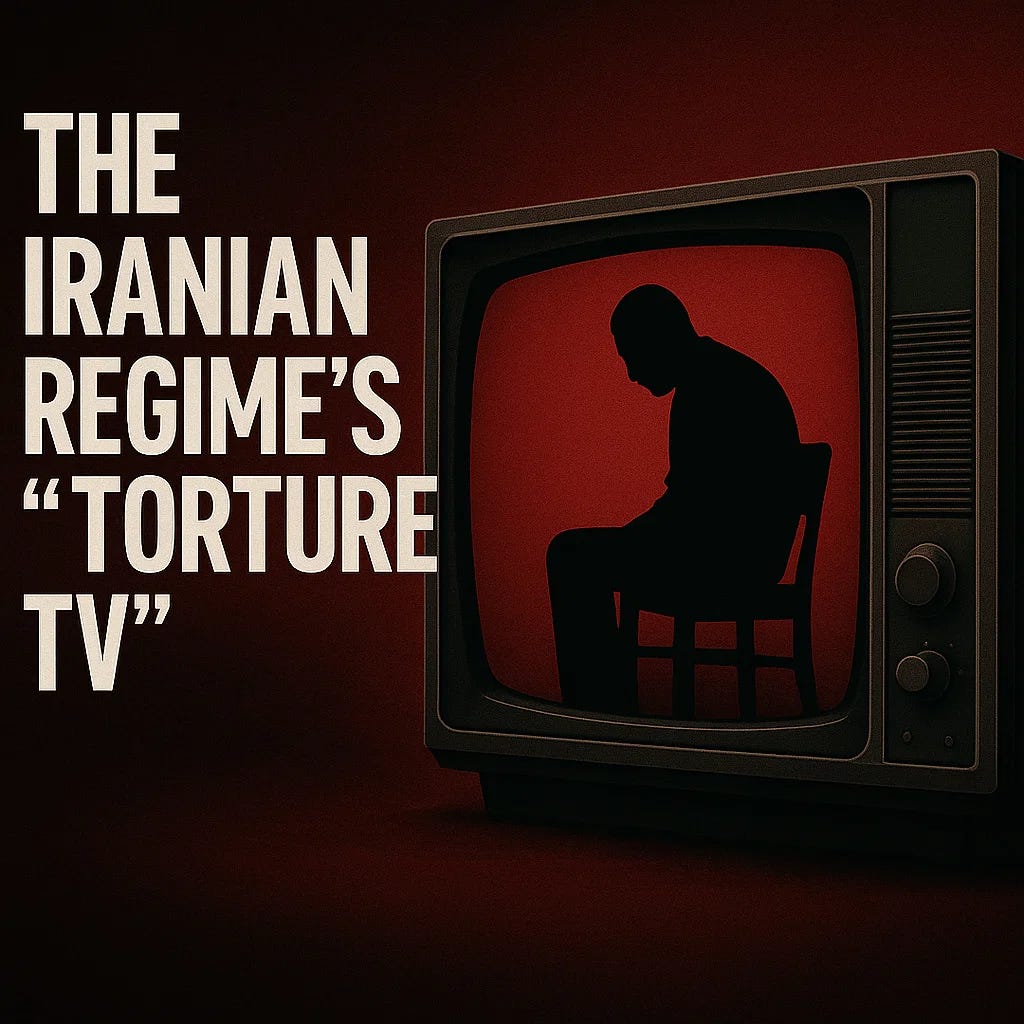Inside Iran’s State-Run Broadcast Outlet: The Regime's "Torture TV"
Israel targeted the Islamic Republic of Iran Broadcasting (IRIB) — dubbed "Torture TV" by many Iranians — which fuels the regime’s oppression and disinformation
As part of its Operation Rising Lion, the Israeli Air Force targeted the headquarters of Iran's state-run media organization, Islamic Republic of Iran Broadcasting (IRIB), on June 16, 2025. This attack was a significant moment in the broader struggle between Israel and the Iranian regime, and it highlighted IRIB’s key role in supporting the Iranian regime’s oppressive tactics. IRIB, often referred to as "Torture TV," has long been a central tool in the Iranian regime's machinery of repression and disinformation, particularly through its role in airing forced confessions extracted under brutal conditions.

Prior to the strike, the Israeli Defense Forces (IDF) issued evacuation warnings in Farsi to Tehran’s 3rd District, which included the IRIB studio. The evacuation alerts, marked on maps and broadcasted to the local population, were part of a broader effort to mitigate civilian casualties. Israeli Defense Minister Israel Katz stated, "The Iranian propaganda and incitement mouthpiece is on its way to disappear," signaling the regime's diminishing control over its narrative machine.

IRIB: A Key Pillar of Iran's Repressive State
IRIB has evolved into a cornerstone of the Islamic Republic’s control over its population and its international image. Operating under the direct control of the Iranian government, IRIB broadcasts content that often serves as a mouthpiece for the regime’s narratives. It is used as a tool to silence dissent and cooperates with the regime’s intelligence and security services. Through its various channels, including the notorious Press TV, IRIB plays a vital role in disseminating propaganda aimed at shaping public perception, both inside Iran and internationally.
Forced Confessions and Torture: IRIB's Dark Legacy
One of the most notorious aspects of IRIB’s operations is its role in broadcasting confessions that are coerced through torture and psychological abuse. Toby Dershowitz, Managing Director of FDD Action, explained that IRIB is the regime's primary vehicle for airing forced confessions: “The regime’s preferred vehicle for airing forced confessions is Islamic Republic of Iran Broadcasting. The length interrogators go to elicit these false confessions on camera illustrates how much the regime values these videos in its broader disinformation campaigns.”
She described the horrific methods used to extract these confessions, including beatings, solitary confinement, and threats to family members. In many cases, the individuals shown on IRIB broadcasts have been tortured to the point of paralysis, underscoring the depth of the regime’s brutality.
Iranian Activists Attest to IRIB’s Role in Suppressing Dissent and Enforcing Oppression
Many critics, including Iranian scholars and activists, have attested to IRIB’s role in furthering the Iranian regime’s oppressive policies. Kasara Aarabi, Director of IRGC Research at United Against Nuclear Iran, stated, “Islamic Republic of Iran Broadcasting (IRIB) is not a TV network. It’s an integral part of the regime’s terrorist machinery abroad and suppressive apparatus at home. Its personnel have even played a direct interrogating role in IRGC prison cells. It is a legitimate target.” This quote underscores the deeply troubling role IRIB plays in the regime's human rights violations, particularly in the production of forced confessions.
Prominent Iranian journalist Masoud Kazemi also shared his critical view of IRIB’s complicity in the regime’s oppression: “The employees of the IRIB were never our classmates or colleagues. They rejoiced during the days when we were in prison, holding up their microphones in front of innocent children to confess against themselves.”
On social media, an image has been circulating allegedly showing an Iranian holding up a note that reads, "Israel, please target Ali Khamenei and the Islamic Republic’s IRIB." This message reflects the growing resentment toward IRIB, with many viewing it as a direct arm of the regime’s efforts to suppress dissent and control public opinion.

In line with this, Eugene Kontorovich, a legal scholar specializing in constitutional and international law at George Mason University, asserted that a state broadcaster used for propaganda is a legitimate military target. He pointed out historical precedents, referencing the U.S. actions during the 1999 NATO bombing of Serbia, where the Serbian TV station in Belgrade was destroyed, and in 1989, when the U.S. targeted Panama's National Radio transmitter.
Sanctions and International Condemnation
The U.S. government has taken significant steps in holding IRIB accountable for its role in human rights abuses. In 2013, the U.S. Treasury Department sanctioned IRIB, and in 2022, it sanctioned six senior IRIB employees for their involvement in facilitating the Iranian regime’s violent suppression of dissent.
According to the U.S. Treasury Department, IRIB and its subsidiaries act as critical tools in the Iranian government’s mass suppression and censorship campaigns. The sanctions highlighted IRIB’s cooperation with Iran’s Ministry of Intelligence and Security (MOIS) and the Islamic Revolutionary Guard Corps (IRGC) in obtaining and disseminating forced confessions from both domestic and foreign detainees.
The Significance of Israel’s Strike
The Israeli airstrike on IRIB’s headquarters underscores the growing international recognition of IRIB’s role as a key enabler of the Iranian regime’s oppressive tactics. As international pressure on Iran continues to mount, the future of IRIB remains uncertain. However, the ongoing struggle for freedom in Iran hinges on weakening the regime’s grip on information. If the regime loses control of outlets like IRIB, it will lose a significant tool in its fight to maintain power.



